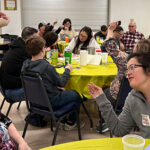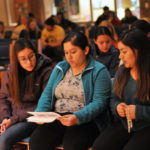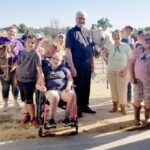By Barb Arland-Fye
The Catholic Messenger
Consider another group of unsung heroes during this time of the coronavirus pandemic, Catholics serving as caregivers to loved ones in our diocese and beyond:
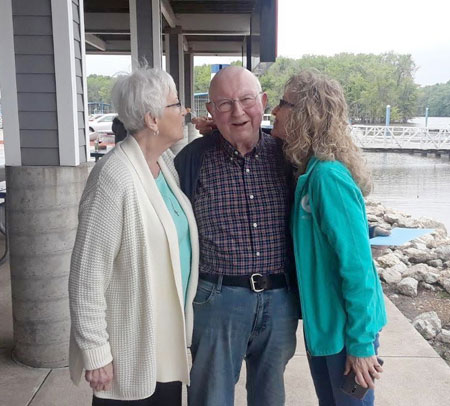
Kathy Cox, right, and her parents Mary Jo and Chuck Messmer.
Kathy Cox of Our Lady of the River Parish in LeClaire put her trust in God and retired early, during the pandemic, to assist her mom with caregiving for Kathy’s dad. Lisa and Rick Willows of Our Lady of Victory Parish in Davenport own their own business and share caregiving duties for their son, Jacob, 21. Lisa juggles those responsibilities with her career as communications director for her parish. Karen Stevens of St. Alphonsus Parish in Mount Pleasant became a caregiver 32 years ago when her husband suffered a life-threatening condition at age 40 that paralyzed him.
Mary Harrison, a retired nurse, member of the Mount Pleasant parish, and the oldest of 8 siblings, has been caregiving most of her life and now assists her parents who live four hours away. Jennifer Hildebrand, the parish nurse for Our Lady of the River Parish in LeClaire, shares caregiving duties with her siblings so that their mom can continue living in her own home.
These caregivers are among 317,000 family caregivers in Iowa, who altogether “spend 295 million hours each year caring for loved ones — a contribution totaling $3.8 billion in unpaid care. They carry out tasks like managing finances, providing transportation, helping with bathing and dressing, cooking meals and more”
(statesaarp.org).
Caring for the caregiver
For many, caregiving is a labor of love, made more complicated by an ongoing pandemic that limits socialization and compounds stress and a sense of isolation.
“Our parents raised us,” said Kathy Cox, 61, explaining why she retired this year to assist her parents, Chuck and Mary Jo Messmer. Kathy reached a point in her faith life that solidified her decision to exchange paid employment and health insurance for volunteer family caregiving.
She witnessed her mom as a caregiver doing everything and becoming overwhelmed in the process. As the oldest of her siblings, Kathy is committed to easing the load. A younger sister, who lives on the east coast, also assisted with caregiving, but had to return home.
On a daily basis, Kathy says goodbye to her husband, Kerry, before heading out of the house to her parents’ home in Davenport. “I pick up groceries, make the bed, and am getting the Christmas stuff out … anything I can do to make her (mom’s) life easier.”
Her dad’s health issues include a condition that affects the circulation in his leg. Kathy rubs his feet, encourages him to walk more because he needs to, and converses with him to keep his mind sharp. “They’re here; they are alive. How blessed am I?” Kathy asks.
Mary Jo is grateful for her daughter’s assistance but admits it is challenging to accept help. “She and the rest of my children felt I was being too much of a caregiver and losing myself in the process,” says Mary Jo. She and her husband belong to Sacred Heart Cathedral in Davenport, and Mary Jo treasures the respite her daughter offers so Mary Jo can attend Mass on Tuesdays and Thursdays.
As a caregiver, Mary Jo admits to losing patience occasionally, but Jesus did too, she points out. “We’re human.” Despite the trials and challenges, Mary Jo feels blessed as a caregiver. She remembers thanking her sister-in-law for taking care of her husband (Mary Jo’s brother) prior to his recent death. Her sister-in-law told her, “It was a privilege.” Being able to care for her own husband, Mary Jo said, “is a gift from God and it’s also a privilege.”
Caregiving for a young adult
Lisa Willows said she feels fortunate that her husband can stay home with their 21-year-old son during the days she works at the parish office and she feels blessed to work from home the other days. Still, challenges exist. “My son is not able to make his own meals and requires assistance with daily living skills. It can be challenging physically and mentally sometimes when he gets bored or frustrated and doesn’t understand why he cannot do the things that he wants to do or go to the places he wants to go. Patience is sometimes in very short supply.”
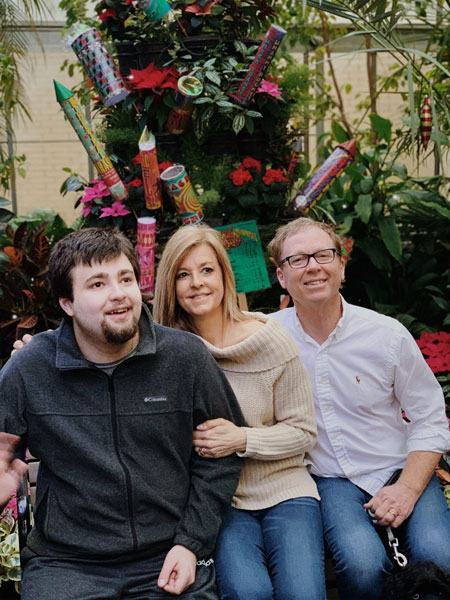
Lisa and Rick Willows care for their son Jacob.
Like Kathy Cox, Lisa is grateful for the support she receives, especially from her husband. “My husband has always been there both physically and emotionally. After 32 years, we know each other pretty well. We are blessed to have family, Tammy (Jacob’s respite worker) and friends that are always there to listen and help with our son if needed. Working in the parish office has its perks as well. If I have questions, I can ask one of our parish nurses or if I need to talk, Father Jake (Greiner) is always ready to listen. I do miss going to church as a family as we have made the decision not to take our son due to COVID.”
The pandemic also affected Jacob’s education. “Jacob was in his last year of high school when the pandemic hit. The first few weeks were pretty easy but then he started getting bored with being at home and not being able to go places. He had a few behaviors that we had never experienced before that were challenging but we got through them. He misses his routine of going to school and seeing his friends. All in all, I would say he is handling it pretty well.”
“It’s a long-observed truism that people engaged in family caregiving often don’t identify themselves as family caregivers, and even if they do, they shrink from accepting assistance from anyone else,” Lisa says. “Receiving help can trigger guilt in a family caregiver, as if they are somehow shirking duties that are theirs and theirs alone.” She encourages people reading this article to check in on caregivers, “let them know that you are going to call weekly or monthly to see how ‘they’ are doing. Ask if you can run any errands for them, drop off a meal or drop them a card.”
Pandemic challenges
Many daytime programs for adults with special needs have been suspended or greatly reduced in nature because of pandemic restrictions and precautions. “This greatly increases the burden of care on the caregiver at home. Some have had to make the difficult decision to quit their daytime paid jobs in order to be at home with their loved one,” says Jennifer Hildebrand, the parish nurse in the LeClaire parish. She also assists her siblings with caregiving duties for their mom, who lives in the Chicago area.
“On a positive note, a couple of the ‘COVID blessings’ have been the option to have our groceries delivered and the Telehealth option for care, reducing the necessity of getting our loved one dressed, into the car and to the appointment. This has reduced the burden of care for the caregiver. Another blessing has been the option for our loved ones to view Mass from home. However, not being able to receive the Eucharist has been very disappointing to those whom I had been visiting prior to the pandemic.”
The parishes of Our Lady of the River, St. John Vianney and Our Lady of Lourdes in Bettendorf, and Sacred Heart Cathedral in Davenport had been in conversation about developing a monthly caregiver support group through the Nourish for Caregivers Catholic-based series. “Our hope is to get that off the ground once the pandemic has ended and the restrictions have been lifted,” Jennifer said.
Some families have opted to care for loved ones at home rather than considering placement in a nursing home because of limited visiting options at long term-care facilities. Families like hers are “opting to be creative to keep our loved ones at home,” Jennifer said. “My 94-year-old mother is still living in her own home in the Chicago area with the help of my brother who has moved in with her. We have hired some additional help during the day and my other brother who lives nearby checks on Mom daily. My sister and I who are both out of town, offer respite care when we can and support Mom in other ways.”
Jennifer says she has seen some “very devout caregivers pay the toll by providing care for their loved ones at the expense of their own health, and sometimes end up dying before the person they were providing care for. Family caregivers manage emergencies, juggle priorities, and suffer isolation — and all that was before COVID. The pandemic brings even more challenges as family caregivers handle caregiving in crisis!”
A caregiver for decades
Karen Stevens’ husband Dave, then 40, suffered a catastrophic brain bleed 32 years ago that paralyzed him. He spent months in the hospital before returning home in New London where Karen has been caring for him ever since. “We’ve been very blessed. His mind is very good,” says Karen. Their daughters were 7 and 9 years old at the time. Dave looked after them when they returned home from school while Karen worked outside the home.
Throughout the years, Karen has been caregiving solo. “I’ve been able to do things by myself,” she says, but wonders how long that will last. Recently, Dave has experienced additional physical weakening. She does not want to turn to a long-term care facility but admits, “I am not a nurse.”
Prior to the pandemic, Karen got together with a group of women from the parish who met for dinner after Saturday night Mass. “I really miss that (get-together), being around people,” she said. Her daughters and grandsons visit, and she enjoys their company, but they do not live in the same community and have their own lives to live.
Grocery shopping on Mondays and Mass on another day of the week have become opportunities to break away from caregiving responsibilities. She used to linger more in the store but because of COVID, she quickly picks up what is on her grocery list and leaves. “I know I’m getting a lot more stressed out the last couple of months,” she admits.
Last month, she attended an online session of Nourish for Caregivers that her Mount Pleasant parish offered, and found that session helpful. Father Paul Connolly, the parish’s pastor, said he believes Nourish for Caregivers is a good ministry that will help the parish reach out to caregivers to “let them know they are not by themselves.”
Karen said her husband is frustrated with his health challenges and she does not blame him. She would feel the same way if she were in his shoes. Despite the challenges, the love she and Dave share carries them through each day. “I feel strongly about being with him. I wouldn’t have it any other way,” she says.
Self-care is essential
As the oldest of eight siblings whose parents moved into an assisted living facility during the pandemic, Mary Harrison of the Mount Pleasant parish finds herself assuming more responsibilities for caregiving from afar. One of her parents called to tell her she needed to call a plumber for them. Healthcare providers have called to confer with her about her mother’s illness and she is overseeing the clearing out of her parents’ former home.
Mary said her mother is experiencing signs of dementia. One day when Mary called and identified herself, her mother responded, “I don’t have a daughter named Mary.” However, her mother remembered two other daughters, one of whom died as a child. While that lack of recognition hurt, Mary’s adult sons later joked with her, “We know the favorites in your family.” Mary laughed. “It’s important to keep humor in all of this.”
Maintaining a sense of humor is one helpful suggestion she took away from participating in the Nourish the Caregivers webinar her parish offered. Some other suggestions:
• Try to be patient (with parents and siblings).
• Accept “that I am vulnerable.”
• Be transparent (in Mary’s case, with siblings). “I can do anything but I can’t do everything.”
• Take care of yourself.
• Take time to pray.
Caregiving responsibilities overwhelmed Mary and felt she was losing herself and losing touch with God. She prayed and got in touch with God. “I actually felt God telling me, or whispering to me, ‘I’m here, you are not alone.’”
Assisting caregivers
Advice from a caregiving mom, Lisa Willows of Our Lady of Victory Parish in Davenport: “Keep asking them to do things with you, go to lunch, see a movie etc. We typically can’t do things spur of the moment but, with notice, we can make plans to have respite or another caregiver help out. Even if we have said no in the past keep asking! Sometimes I think people stop asking because we have said no in the past, or they assume that we can’t go because we are caring for someone else. When you stop asking that makes people feel even more isolated and alone.”









